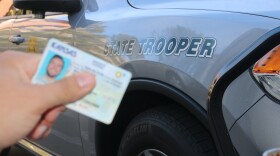A patient who sued the University of Kansas Hospital for fraud and negligence, alleging she was misdiagnosed with pancreatic cancer and the hospital covered it up, quietly settled her case last year on confidential terms.
Although the settlement was sealed, KCUR has learned that the Kansas agency that provides excess insurance coverage for medical providers — insurance over and above the providers’ primary coverage — agreed to pay out $1.8 million on behalf of the hospital and the doctor who made the misdiagnosis.
It’s not known how much the hospital’s and doctor’s primary insurers paid, but the excess insurance payments suggest the overall settlement totaled at least several million dollars.
A spokeswoman for KU Hospital said it would have no comment on the settlement.
The Kansas agency, known as the Health Care Stabilization Fund, was created in 1976 to stabilize liability coverage for health care providers.
In response to a request made by KCUR under the Kansas Open Records Act, the agency said that as part of the settlement with the patient, Wendy Ann Noon Berner, it had incurred $1 million on behalf of the doctor, Meenakshi Singh, and $800,000 on behalf of KU Hospital.
The money is being paid out in installments: last December, the agency said it paid $500,000 on behalf of Singh and $300,000 on behalf of the hospital. The remaining payments will be made on behalf of Singh and the hospital this December and in December 2020.
Singh was chair of KU Hospital’s pathology department at the time she made the misdiagnosis in 2015, not long after she had been appointed. She is no longer with the hospital and could not be reached for comment.
The case has been an extremely sensitive matter for KU Hospital, which vehemently contested the allegations and hired a high-priced battalion of lawyers and public relations experts to fight them.
The matter first came to light when Singh’s predecessor as the hospital’s pathology chair, Lowell Tilzer, filed a whistleblower complaint in mid-2016 alleging she had misdiagnosed a patient with cancer and then covered up the mistake after parts of an unspecified organ were removed.
Tilzer alleged that the patient had not been informed of the misdiagnosis and that the hospital sought to retaliate against him after he called the misdiagnosis to the attention of the Joint Commission, which accredits and certifies hospitals.
After the patient’s surgery, other members of KU Hospital’s pathology department examined tissue samples and determined that the organ was not cancerous, according to Tilzer’s lawsuit. But Singh allegedly covered up the misdiagnosis by appending an addendum to her original report saying the original cancer diagnosis matched the removed organ.
A subsequent review by the Centers for Medicare and Medicaid Services found that Singh, who was not certified in cytopathology (the study and diagnosis of disease at the cellular level), was not qualified by KU’s own standards to make Berner’s diagnosis.
Tilzer said that after he reported what happened to the Joint Commission, he was taken to task by KU Hospital President and CEO Bob Page, whom he said berated him, accused him of lying and described his report to the commission as “pitiful” and “despicable” behavior.
Tilzer withdrew his lawsuit a month after he filed it. But in an unusual twist, he appended a statement from the then still-anonymous patient stating KU had asked her to sign an affidavit absolving the hospital of responsibility for the actions described in his lawsuit. The patient said she refused to sign it.
The patient, Berner, eventually stepped forward and filed her own lawsuit. In her complaint, she accused the hospital and Singh of misdiagnosing her with pancreatic cancer and then covering up the misdiagnosis after a portion of her pancreas and other body parts were surgically removed.
Berner said she only learned of the misdiagnosis after reading news accounts of Tilzer’s whistleblower case.
In its response to Berner's complaint, KU Hospital disputed Berner's characterization of what happened and said that many of her allegations “reference undisputable hearsay and speculation, and many would arguably constitute defamation” if they were not part of the lawsuit.
Berner did not return calls seeking comment on her settlement with the hospital and Singh. Her attorney, Chad Beaver, said, “We appreciate your interest in the story, but the parties have reached a confidential settlement agreement and we are not permitted to comment any further.”
Tilzer, who is now semi-retired, declined to comment about the litigation or the settlement.
Although confidential settlement agreements are common, at some point during the litigation the entire case file in Wyandotte County District Court was sealed. It’s not clear why that was done or at whose behest. The file was publicly accessible in the early stages of the litigation.
Wyandotte County District Judge Timothy Dupree, to whom the case was assigned, said he would get back to KCUR by this week on why the file was sealed. On Monday, his assistant said the file had been unsealed, although she declined to say if the judge had issued an order to unseal it.
The lawyers who represented KU Hospital and Singh did not return phone calls.
KU Hospital is not the only hospital where pathology lab errors have led to a misdiagnosis.
Wake Forest Medical Center in North Carolina last year determined that at least two patients were mistakenly diagnosed with cancer and three others faced potential delays in cancer treatments because their lab results showed they did not have cancer. The hospital undertook a review of more than 9,000 cases from its pathology lab to determine if there were any more instances of mistaken diagnoses.
And earlier this year, a yearlong review of nearly 34,000 pathology lab results at the VA Hospital in Fayetteville, Arkansas, found 30 mistaken diagnoses. The doctor blamed for the misdiagnoses, Robert Morris Levy, was indicted by a federal grand jury in August on three counts of involuntary manslaughter as well as multiple counts of wire fraud, mail fraud and making false statements.
The Joplin Globe reported that the Veterans Administration said 12 veterans may have died as a result of misdiagnoses by Levy, who was allegedly impaired when working as a pathologist at the hospital.
Dan Margolies is a senior reporter and editor at KCUR. You can reach him on Twitter @DanMargolies.
Copyright 2019 KCUR 89.3








